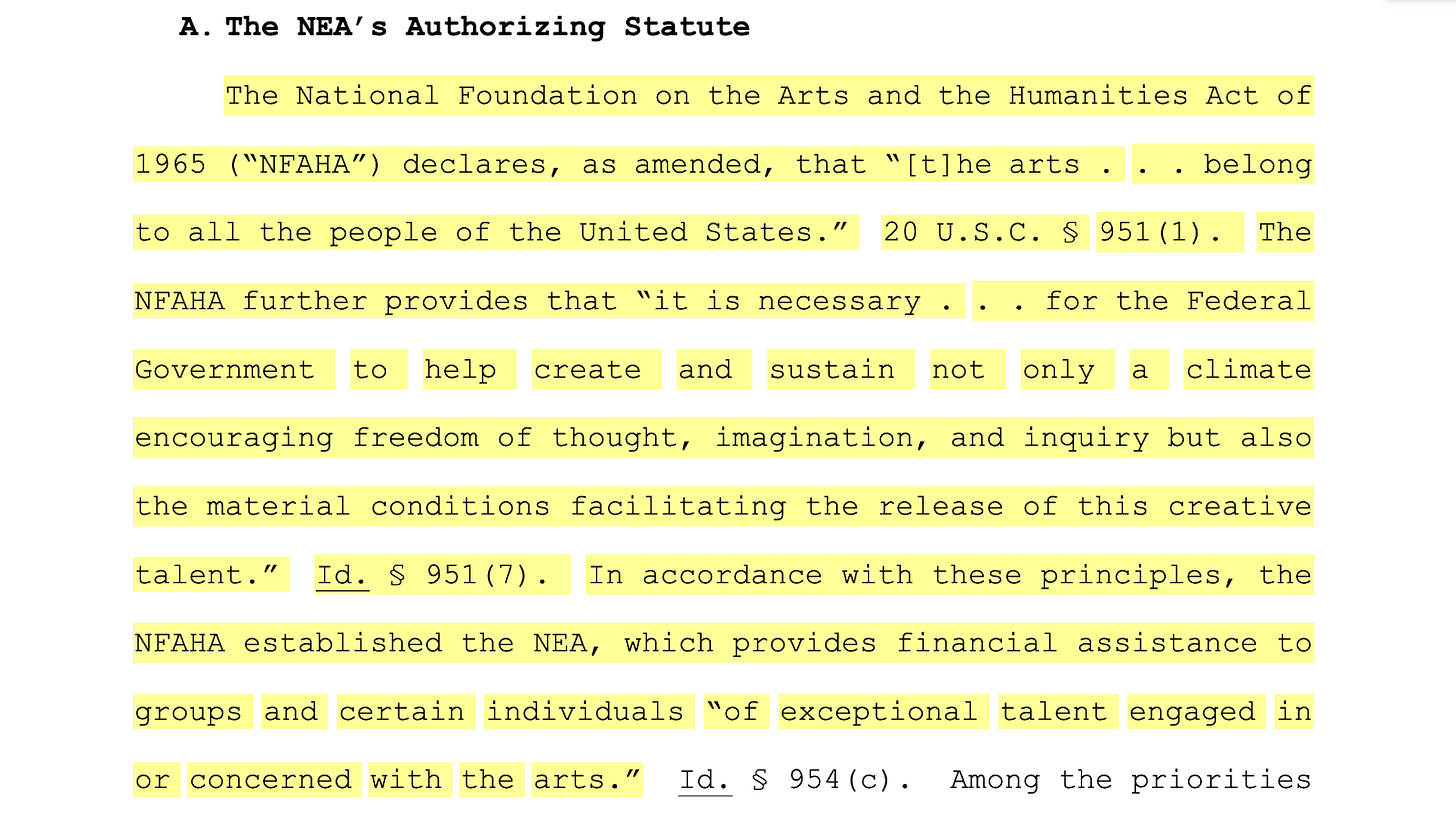Court Sides With ACLU And Queer Performers Over Federal Trans Funding Restrictions
As in many authoritarian campaigns, art has been recognized as a vital form of resistance—but bad actors have sought to curtail it accordingly.

The Trump Administration has lost yet another battle with one of its most formidable foes: the arts.
The right has long self-identified as the protector of free speech, except when that speech has to do with race, gender, sexuality, queerness, science, (non-Christian) religion, and anything else the Trump regime deems seditious, such as being critical of the government.
Four plaintiffs—Rhode Island Latino Arts, National Queer Theater, The Theater Offensive and Theatre Communications Group—sued federal officials following the signing of an executive order which directed the National Endowment for the Arts (NEA) to disfavor grant applications that “promote gender ideology.” Artists, represented by the ACLU, argued this provision violated the First Amendment, the Administrative Procedure Act (APA), and the Fifth Amendment.
On Sept. 19, Senior U.S. District Court Judge William E. Smith sided with the plaintiffs’ first two claims, denouncing “a viewpoint-based standard of review to Plaintiffs that disfavors applications deemed ‘to promote gender ideology”—a catch-all dogwhistle describing depictions of gender and sexuality outside rigid heterosexual marriage. The court “vacates and sets aside Defendants’ current plan to implement the Executive Order.”
The National Endowment for the Arts is an independent agency created by Congress to fund and shepherd great American art. The problem seems to be that Trump wants the agency to discriminate against artists who do not focus on straight, cisgender white men—prioritizing political virtue signaling over actual merit and talent, and stymieing the free marketplace of ideas to advance his political agenda.
While the government argued that NEA projects, which are government funded, are therefore government speech, the judge found that this was instead private speech supported by government funds—which means that artists’ freedom of expression should remain unobstructed.
The Trump Administration also correctly noted that “Plaintiffs undisputedly lack any right” to receive government grants, which are competitive.
But Judge Smith found this rhetoric “unavailing.” The plaintiffs never claimed to be entitled to the grant. “Rather,” Smith writes, “they claim a right to have their applications assessed according to criteria that are not viewpoint discriminatory.”
“This decision affirms what we have always believed: the freedom to create, to express one’s truth, and to tell our stories is a right protected by the First Amendment,” said Marta V. Martínez, the executive director of Rhode Island Latino Arts, in an email to Erin in the Morning. “As an organization deeply rooted in storytelling, theater, and the preservation of cultural history, we are relieved and grateful that the courts have recognized the importance of protecting artistic expression for all people, including those in LGBTQ+ communities.”
As in many authoritarian campaigns, art has been recognized as a vital form of resistance—but bad actors have sought to curtail it accordingly. During the reign of the Nazis, Adolf Hitler waged a vicious purge of German-dubbed “degenerate art,” works which were often made by, for and about Jews (among other things). Another famous example of this, closer to home, was the backlash to The Crucible (1953) by Arthur Miller. The play was a scathing political commentary on McCarthyism that resulted in Miller (and other “subversive” artists) being blacklisted from the industry at the government’s behest; he was even denied a passport. And as Erin in the Morning reported recently, chalk street art in Orlando honoring LGBTQ gun violence victims led to multiple arrests. We also shined a light on an Oklahoma college performance of a show dramatizing the lives of Shakespearean actors, which was cancelled by the school, which allegedly feared backlash if they let it debut. (That play, Boy My Greatness, contained themes of queerness.) And at the Smithsonian, a renowned Black artist cancelled an exhibition rather than let the Trump Administration bully her into removing a painting of a transgender woman dressed as Lady Liberty.
“Congress specifically set up the National Endowment for the Arts to insulate it from this type of political meddling in funding the arts,” said Steven Brown, executive director of the ACLU of Rhode Island. “This ruling is a win for our plaintiffs, and for free speech.”




Well i'm glad to hear this, we'll have to see what SCOTUS says, as trump will most likely appeal it to them. Whatever they say, they can take away our funding, but they cannot silence artists. We will continue making art, and we will be prolific.
one of these small groups that actually fought the lawsuits rather than caving should give Jimmy Kimmel a time slot and tell him to f*g it up a little